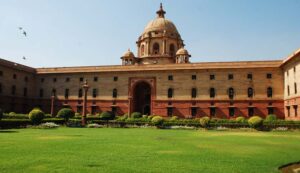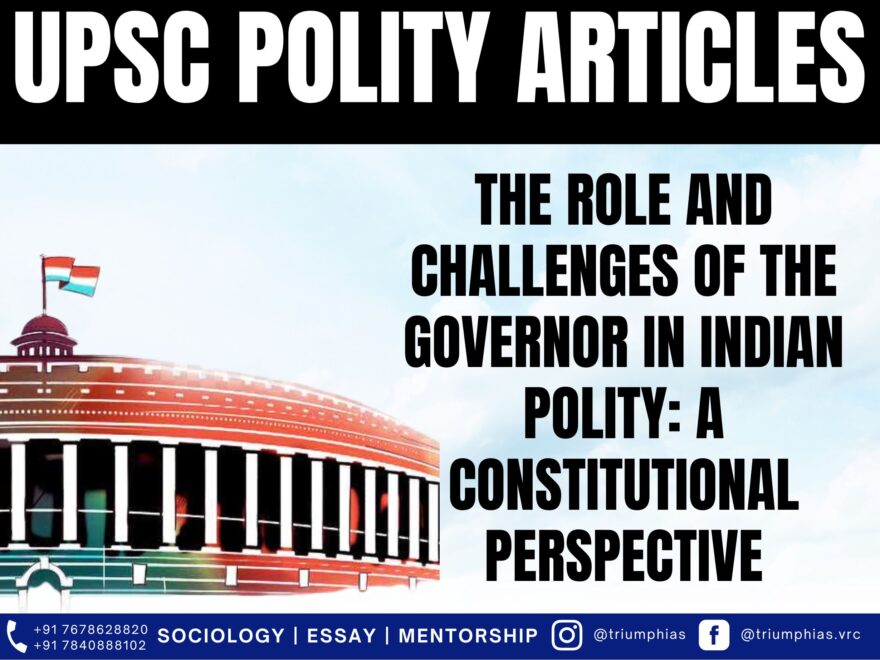Governor
(Relevant for Polity Section of General Studies Paper Prelims/Mains)

The appointment of the Governor, along with their powers and all matters concerning the Governor’s office, are detailed in Articles 153 to 162 of the Indian Constitution.
The responsibilities of the Governor closely mirror those of the President of India, but at the state level. The Governor carries out equivalent functions to those of the President, but for the respective state. The Governor serves as the executive leader of a state, and the functions performed align with those of the President of India’s office. In accordance with the Constitution of India, the administrative structure operates similarly to that of the Central Government.
It is stated that the Governor has a dual role.
- He is the constitutional head of the state, bound by the advice of his council of ministers.
- He functions as a vital link between the Union Government and the State Government.
Constitutional provisions
The appointment and authority of the government are outlined in Part VI of the Indian Constitution. Article 153 stipulates that a Governor shall be appointed for each State, and it’s possible for an individual to hold the position of Governor for multiple States.
The Governor functions in a ‘Dual Capacity,’ serving both as the Constitutional head of the state and as its representative. This dual role reflects the federal structure of the Indian political system, positioning the Governor as a vital intermediary between the central and state governments.
The Governor’s term typically spans five years, but it can be shortened under specific circumstances, including:
- Dismissal by the President, following the advice of the council of ministers led by the Prime Minister. However, removal of governors without valid grounds is not permissible. The President holds the responsibility to remove a Governor whose actions are deemed unconstitutional and malicious by the courts.
- Voluntary resignation by the Governor.
Issues
- Instances of Governor Positions being exploited have been prevalent, often influenced by the ruling party at the national level. The manner in which appointments are typically made has contributed to this issue.
- In several cases, individuals with affiliations to specific political ideologies, such as politicians and former bureaucrats, have been designated as Governors by the government. This practice contradicts the constitutionally prescribed impartial role and has led to evident biases, as witnessed in situations like those in Karnataka and Goa.
- Recent events have brought to light the Governor of Rajasthan’s alleged violation of the model code of conduct. His alignment with the ruling party runs counter to the expectation of non partisanship from individuals holding constitutional posts.
- These occurrences have given rise to derogatory terms like “agent of the Centre,” “puppet,” and “rubber stamp” to describe state Governors. Their discretionary powers, such as inviting the leader of the largest party/alliance to form the government after elections, have frequently been exploited to favour specific political entities.
- The Governors Committee of 1971 emphasized the Governor’s responsibility in ensuring that political instability does not disrupt the state administration. This committee underscored the need for regular reporting on the political state of affairs in the state.
- However, the application of President’s rule (Article 356) in cases of constitutional machinery breakdown within a state has been consistently misused by the central government.
- The Governor’s role is tied to the advice of their council of ministers, a circumstance that has diminished the significance of the office, rendering it akin to a mere formality. This situation was acknowledged by TB. Pattabhi Sitaramayya, a former Governor of Madhya Pradesh, who noted that he had limited public functions apart from submitting fortnightly reports to the President.
- The arbitrary removal of Governors before the conclusion of their tenure has emerged as a notable concern in recent times. It’s important to note that Governors cannot be removed solely due to discord with the Union government’s policies or ideologies, or the party in power at the national level, or based on the Union government’s lack of confidence in them.
Judgements and Recommendations
- The Nabam Rebia judgement of 2016, delivered by the Supreme Court, established that the exercise of the Governor’s discretion under Article 163 must be bounded and not capricious. The Governor’s decision-making should be rational, guided by good faith, and marked by prudence.
- The Administrative Reforms Commission of 1968 advocated that the Governor’s report concerning the imposition of President’s rule should be impartial and the Governor should independently assess the situation.
- The Rajamannar Committee in 1971 recommended the removal of Articles 356 and 357 from the Indian constitution. It advised that safeguards against arbitrary actions of the ruling party at the national level should be integrated into the constitution to address concerns under Article 356.
- Furthermore, the Rajamannar Committee stressed that the State’s Governor should not perceive themselves as agents of the central government, but instead fulfill their role as the constitutional head of the State.
- The Sarkaria Commission, established in 1988, recommended that Article 356 be invoked only in exceptional circumstances, when it is necessary to restore the disrupted constitutional mechanisms in the State. It also suggested that a prior warning should be given to the state government if it deviates from constitutional norms before resorting to Article 356.
- The “Justice V.Chelliah Commission” in 2002 proposed that Article 356 should be exercised sparingly, serving as a last resort after exploring options under Articles 256, 257, and 355.
- The “Punchhi Commission” recommended amendments to Articles 355 and 356, aiming to safeguard the interests of the States and mitigate potential misuse by the central government.
To master these intricacies and fare well in the Sociology Optional Syllabus, aspiring sociologists might benefit from guidance by the Best Sociology Optional Teacher and participation in the Best Sociology Optional Coaching. These avenues provide comprehensive assistance, ensuring a solid understanding of sociology’s diverse methodologies and techniques.
Governor of India, Governor, Governor, Indian Constitution, Articles 153-162, Dual Role, State Government, Union Government, President’s Rule, Article 356, Political Bias, Constitutional Provisions, Nabam Rebia Judgement, Rajamannar Committee, Sarkaria Commission, Punchhi Commission, Administrative Reforms Commission, Political Instability, Impartiality, Council of Ministers, Governor of India, Indian Constitution, Governor of India, Governor, Indian Constitution, Governor, Best Sociology Optional Coaching, Sociology Optional Syllabus.

Choose The Best Sociology Optional Teacher for IAS Preparation?
At the beginning of the journey for Civil Services Examination preparation, many students face a pivotal decision – selecting their optional subject. Questions such as “which optional subject is the best?” and “which optional subject is the most scoring?” frequently come to mind. Choosing the right optional subject, like choosing the best sociology optional teacher, is a subjective yet vital step that requires a thoughtful decision based on facts. A misstep in this crucial decision can indeed prove disastrous.
Ever since the exam pattern was revamped in 2013, the UPSC has eliminated the need for a second optional subject. Now, candidates have to choose only one optional subject for the UPSC Mains, which has two papers of 250 marks each. One of the compelling choices for many has been the sociology optional. However, it’s strongly advised to decide on your optional subject for mains well ahead of time to get sufficient time to complete the syllabus. After all, most students score similarly in General Studies Papers; it’s the score in the optional subject & essay that contributes significantly to the final selection.
“A sound strategy does not rely solely on the popular
Opinion of toppers or famous YouTubers cum teachers.”
It requires understanding one’s ability, interest, and the relevance of the subject, not just for the exam but also for life in general. Hence, when selecting the best sociology teacher, one must consider the usefulness of sociology optional coaching in General Studies, Essay, and Personality Test.
The choice of the optional subject should be based on objective criteria, such as the nature, scope, and size of the syllabus, uniformity and stability in the question pattern, relevance of the syllabic content in daily life in society, and the availability of study material and guidance. For example, choosing the best sociology optional coaching can ensure access to top-quality study materials and experienced teachers. Always remember, the approach of the UPSC optional subject differs from your academic studies of subjects. Therefore, before settling for sociology optional, you need to analyze the syllabus, previous years’ pattern, subject requirements (be it ideal, visionary, numerical, conceptual theoretical), and your comfort level with the subject.
This decision marks a critical point in your UPSC – CSE journey, potentially determining your success in a career in IAS/Civil Services. Therefore, it’s crucial to choose wisely, whether it’s the optional subject or the best sociology optional teacher. Always base your decision on accurate facts, and never let your emotional biases guide your choices. After all, the search for the best sociology optional coaching is about finding the perfect fit for your unique academic needs and aspirations.
To master these intricacies and fare well in the Sociology Optional Syllabus, aspiring sociologists might benefit from guidance by the Best Sociology Optional Teacher and participation in the Best Sociology Optional Coaching. These avenues provide comprehensive assistance, ensuring a solid understanding of sociology’s diverse methodologies and techniques. Sociology, Social theory, Best Sociology Optional Teacher, Best Sociology Optional Coaching, Sociology Optional Syllabus.
Best Sociology Optional Teacher, Sociology Syllabus, Sociology Optional, Sociology Optional Coaching, Best Sociology Optional Coaching, Best Sociology Teacher, Sociology Course, Sociology Teacher, Sociology Foundation, Sociology Foundation Course, Sociology Optional UPSC, Sociology for IAS,
Follow us :
🔎 https://www.instagram.com/triumphias
🔎https://www.youtube.com/c/TriumphIAS
https://t.me/VikashRanjanSociology
Find More Blogs
|
Scope of the subject and comparison with other social sciences |
|||
|
|
|
|
Modernity and social changes in Europe |

